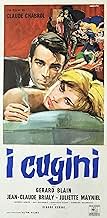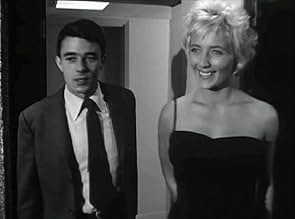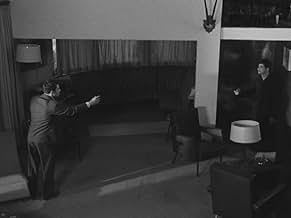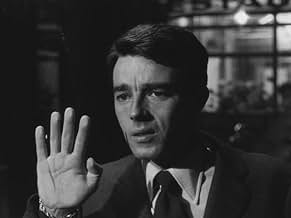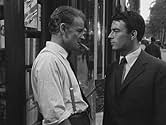Les cousins
- 1959
- Tous publics
- 1h 52min
NOTE IMDb
7,2/10
3,4 k
MA NOTE
Deux cousins partagent un appartement, mais une animosité s'installe entre eux à l'arrivée d'une femme.Deux cousins partagent un appartement, mais une animosité s'installe entre eux à l'arrivée d'une femme.Deux cousins partagent un appartement, mais une animosité s'installe entre eux à l'arrivée d'une femme.
- Réalisation
- Scénario
- Casting principal
- Récompenses
- 1 victoire au total
Avis à la une
Les Cousins is definitively part of the French New Wave of the late 1950s. Whilst slightly more polished than the films of his contemporaries (notably Godard and Truffaut), Chabrol's film bubbles with an insurgence of new cinematographic techniques and fresh acting talent. The sense of newness is reinforced by presence of so many young actors, dressed elegantly in tuxedos and evening dresses, but acting somewhat delinquently for the most part. The film appears almost like the christening party for the birth of a new era in French cinema.
Both the direction and photography are of a high calibre and capture very well the changing mood of the central character, Charles. The film starts cheerfully and optimistically with the young man's arrival in Paris. Like him, we are enchanted by the bright lights, the wide boulevards and the historic monuments. But then, little by little, the mood changes to ennui and disappointment when the shallowness of the Paris jet set is revealed. Finally, a much darker mood prevails as Charles' best efforts to succeed are brutally crushed by a combination of circumstances, partly of his own making but largely as a result of the hand of fate. This ability to alter the mood of the film so subtly and effectively is one of Chabrol's great skills as a director and is used to far greater effect in some of his subsequent thrillers.
Both of the two central characters, Charles and Paul, are played admirably by Gérard Blain and Jean-Claude Brialy. Blain manages to capture the innocence of the outsider and offers a sympathetic and memorable performance. Brialy seems to revel in his role as the extravagant city student, hosting his parties with the gusto of a true bon-vivant, whilst exhibiting a more complicated and sensitive persona in his conversations with the characters Charles and Florence.
Both actors were used by Chabrol in an earlier film, Le Beau Serge, which, in some ways, is the mirror image of Les Cousins. In Le Beau Serge, Brialy played a city boy who returns to his home in a provincial town where he met up wih a childhood friend played by Blain. Brialy's character was the outsider and ultimately he was destroyed by his alien surroundings. In Les Cousins, the situation is cleverly reversed. Here, Blain's character is a country boy who joins Brialy in the city of Paris. It is Blain's character who is now the outsider, and who is finally destroyed by his unfamiliar environment. It is interesting to watch the two films back-to-back, to note the similarities and compare the differences. Both films seem to side with the outsider and condemn the society that rejects him, although it is perhaps disappointing that, in both cases, that the outsider is destroyed without having any significant impact on the society that crushed him. At least, in Le Beau Serge, the victim's fate was sealed by an altruistic desire to do some good for the community that rejected him, whereas in Les Cousins, the victim brought his destruction on himself by trying to attack the society he felt so repulsive.
Les Cousins lacks the emotional intensity of Le Beau Serge and appears in some places a little too stage-managed. (The ending is particularly stagy, but it works perfectly to the film's advantage.) On the plus side, Les Cousins benefits from a far superior musical score, a more interesting set of characters, and some impressive location filming in Paris. It is an engaging and accessible film which still appears fresh and vibrant.
Both the direction and photography are of a high calibre and capture very well the changing mood of the central character, Charles. The film starts cheerfully and optimistically with the young man's arrival in Paris. Like him, we are enchanted by the bright lights, the wide boulevards and the historic monuments. But then, little by little, the mood changes to ennui and disappointment when the shallowness of the Paris jet set is revealed. Finally, a much darker mood prevails as Charles' best efforts to succeed are brutally crushed by a combination of circumstances, partly of his own making but largely as a result of the hand of fate. This ability to alter the mood of the film so subtly and effectively is one of Chabrol's great skills as a director and is used to far greater effect in some of his subsequent thrillers.
Both of the two central characters, Charles and Paul, are played admirably by Gérard Blain and Jean-Claude Brialy. Blain manages to capture the innocence of the outsider and offers a sympathetic and memorable performance. Brialy seems to revel in his role as the extravagant city student, hosting his parties with the gusto of a true bon-vivant, whilst exhibiting a more complicated and sensitive persona in his conversations with the characters Charles and Florence.
Both actors were used by Chabrol in an earlier film, Le Beau Serge, which, in some ways, is the mirror image of Les Cousins. In Le Beau Serge, Brialy played a city boy who returns to his home in a provincial town where he met up wih a childhood friend played by Blain. Brialy's character was the outsider and ultimately he was destroyed by his alien surroundings. In Les Cousins, the situation is cleverly reversed. Here, Blain's character is a country boy who joins Brialy in the city of Paris. It is Blain's character who is now the outsider, and who is finally destroyed by his unfamiliar environment. It is interesting to watch the two films back-to-back, to note the similarities and compare the differences. Both films seem to side with the outsider and condemn the society that rejects him, although it is perhaps disappointing that, in both cases, that the outsider is destroyed without having any significant impact on the society that crushed him. At least, in Le Beau Serge, the victim's fate was sealed by an altruistic desire to do some good for the community that rejected him, whereas in Les Cousins, the victim brought his destruction on himself by trying to attack the society he felt so repulsive.
Les Cousins lacks the emotional intensity of Le Beau Serge and appears in some places a little too stage-managed. (The ending is particularly stagy, but it works perfectly to the film's advantage.) On the plus side, Les Cousins benefits from a far superior musical score, a more interesting set of characters, and some impressive location filming in Paris. It is an engaging and accessible film which still appears fresh and vibrant.
Chabrol's second feature. I haven't seen his first, Le beau Serge, but this is the most French New Wave film I've seen from Chabrol. As such, it's by far my favorite. I like several of his films, but I do find even my favorites a little dry. This one is just gorgeous and it's quite a lot of fun throughout. Gerard Blain plays a provincial who is moving to Paris to go to college. He moves in with his cousin (Jean-Claude Brialy), who is himself a student. Brialy is a total party animal, spending all his free time drinking with friends and none of it studying. The two get along at first, but then a woman (Juliette Mayniel) comes between them. The film is kind of a precursor to Jules et Jim.
The 13th film I saw of Claude Chabrol. The least I liked. I understand the meaning and the message of the film, but practically nothing captivated me: Neither the characters (nor Charles's own character captivated me) nor the rhythm of the film (a very long sequence in which we get to know Paul's friends, who swim and the way the "bourgeoisie" is presented to us, there are immense films that "capture" this social class in a much more skilful and humorous way, nor the message of the film, which I find to be inadequate and unlikely in the form how it is performed. I liked Chabrol's film the previous year, his first one, "le beau serge", curiously with the same double protagonist. I can not give this "les cousins" more than 6/10.
The naive mama's boy Charles (Gérard Blain) moves to Paris to live with his debauched bon-vivant cousin Paul Thomas (Jean-Claude Brialy) in his apartment. He meets Paul's friend, the pervert pimp Jean "Clovis", who is older than them. Paul studies hard and writes daily to his mother while Paul gives frequent parties and neither studies nor goes to lectures. When Charles meets Paul's friend, the gorgeous and promiscuous Florence (Juliette Mayniel), he falls in love with her. They talk later through telephone and Florence understands the invitation of Charlie to meet her wrongly and arrives earlier at his apartment. She meets the cynical Paul and Clovis that tell her that she is a slut and will cheat Charlie when she becomes bored with him, and she ends having sex with Paul. Florence moves to the apartment to live with Paul, disturbing the attention of Charlie in his studies. When the final exams come, there is a tragedy.
"Les cousins" (1959) is the second film directed by Claude Chabrol, with the story of two cousins and depicting an empty generation. One cousin is from the countryside, naive, shy and mama's boy; the other is popular and pervert, although protecting his cousin most of the time. The beautiful Juliette Mayniel performs a key element in the story, since Charles has a crush on her, but Paul destroys their relationship since the twenty-year-old woman is promiscuous and has slept with most of his friends. However, the concentration of Charles is lost, and he fails his exam. The tragic conclusion is very sad. My vote is seven.
Title (Brazil): "Os Primos" ("The Cousins")
"Les cousins" (1959) is the second film directed by Claude Chabrol, with the story of two cousins and depicting an empty generation. One cousin is from the countryside, naive, shy and mama's boy; the other is popular and pervert, although protecting his cousin most of the time. The beautiful Juliette Mayniel performs a key element in the story, since Charles has a crush on her, but Paul destroys their relationship since the twenty-year-old woman is promiscuous and has slept with most of his friends. However, the concentration of Charles is lost, and he fails his exam. The tragic conclusion is very sad. My vote is seven.
Title (Brazil): "Os Primos" ("The Cousins")
This film by Claude Chabrol reminds me of the old story of the country mouse and the city mouse. The country mouse is excited to see the big city but his bumbling provincial ways are out of step with his more sophisticated city cousin. This seems to be pretty much the basis for this film, "Les Cousins"! Though of course, being a Chabrol film it will have some dark edges and twists!
Charles is the guy raised in the country. He's slow and lacks confidence with women. Paul, on the other hand, was raised in the city and women hang all over him and put out like crazy for him. When Charles comes to stay with him while he goes to college, he is quite the contrast to Paul who is a confident ladies' man. He's also more bookish and introspective than Paul. All Paul wants is to have a good time and have sex--and he couldn't care less about his studies at the college. And, in a way, Paul has contempt for his cousin when Charles falls head over heels for Florence--and he soon beds Florence and asks her to move in with him. As for Charles, he is sad but sinks his energy into his classwork and tries to do the right thing. What's next for this odd mismatched pair? Bet you won't be able to guess!
This film is considered by many to be one of the best and earliest New Wave films. Like many New Wave movies, the normal film formulas are turned on their head and goodness isn't necessarily rewarded and the ending is quite ambiguous. Well worth seeing and darkly enjoyable.
Charles is the guy raised in the country. He's slow and lacks confidence with women. Paul, on the other hand, was raised in the city and women hang all over him and put out like crazy for him. When Charles comes to stay with him while he goes to college, he is quite the contrast to Paul who is a confident ladies' man. He's also more bookish and introspective than Paul. All Paul wants is to have a good time and have sex--and he couldn't care less about his studies at the college. And, in a way, Paul has contempt for his cousin when Charles falls head over heels for Florence--and he soon beds Florence and asks her to move in with him. As for Charles, he is sad but sinks his energy into his classwork and tries to do the right thing. What's next for this odd mismatched pair? Bet you won't be able to guess!
This film is considered by many to be one of the best and earliest New Wave films. Like many New Wave movies, the normal film formulas are turned on their head and goodness isn't necessarily rewarded and the ending is quite ambiguous. Well worth seeing and darkly enjoyable.
Le saviez-vous
- AnecdotesTwo endings were filmed, one optimistic (the reconciliation between the two cousins), which was discarded, and the other pessimistic, which was finally chosen.
- Citations
Le libraire: Read Dostoyevsky. He addresses all your concerns.
- ConnexionsFeatured in Fejezetek a film történetéböl: A francia új hullám (1990)
- Bandes originales40e Symphonie en Sol Majeur (Koechel 550) 1er movement
Music by Wolfgang Amadeus Mozart (as W.A. Mozart)
Performed by London Symphony Orchestra (as Orchestre Symphonique de Londres)
Conducted by Josef Krips (as Joseph Krips)
Disque DECCA
Meilleurs choix
Connectez-vous pour évaluer et suivre la liste de favoris afin de recevoir des recommandations personnalisées
- How long is The Cousins?Alimenté par Alexa
Détails
Box-office
- Budget
- 6 000 000 F (estimé)
- Durée1 heure 52 minutes
- Couleur
- Mixage
- Rapport de forme
- 1.37 : 1
Contribuer à cette page
Suggérer une modification ou ajouter du contenu manquant

Lacune principale
By what name was Les cousins (1959) officially released in Canada in English?
Répondre
